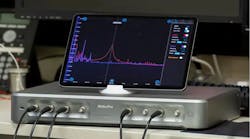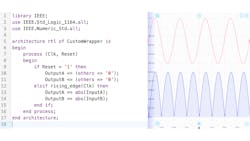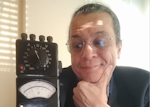Software-Defined Test Platform Integrates ChatGPT
Liquid Instruments recently announced the addition of the ChatGPT language model to its Moku family of software-defined test & measurement platforms, providing the ability to generate custom FPGA code that's instantly deployable. It enables users without any prior knowledge of digital logic design or programming to expedite FPGA programming, leveraging ChatGPT and Moku Cloud Compile. Thus, users can deploy custom bitstreams on their Moku devices.
Engineers and technicians now are able to use natural-language commands to develop VHDL code faster and with less time and effort. The Moku platform deploys the code to the device’s FPGA, allowing for real-time interaction with real-world signals. Using AI with Moku Cloud Compile not only speeds up testing, it gives users the ability to do more than what was possible with legacy devices.
An engineer with any level of experience can leverage the ChatGPT functionality to create complex VHDL code, which is used by Moku Cloud Compile (MCC) and loaded into a Moku device. As a result, users can perform tasks such as advanced triggering logic and real-time signal processing to address time-gated measurements of infrequent events, or signal conditioning of sensor data.
Speeding up development time, MCC manages issues like complicated FPGA programming tools, interfacing, and deploying to real-world hardware, while ChatGPT writes the actual code. Using Moku:Pro as an example, the code snippet shown in the figure below sets the two outputs to the absolute value of the inputs, with ChatGPT doing the hard work. While this is a simple example, ChatGPT can write logic to compute math operations, logical operations, and more complex processing like moving averages and outlier rejection.
In addition, ChatGPT will suggest improvements and optimizations to any existing code, enabling further functionality in modules such as filtering or signal processing. The company also launched upgrades for Moku:Lab, Moku:Pro, and Moku:Go, adding multi-instrument and customization capabilities. This helps strengthen API support, improve the capabilities of multiple software-defined instruments, and support a broader range of use cases for closed-loop control systems, precision spectroscopy, microscopy, and others.
Improving consistency in user experience and code portability, Moku version 3.0 also integrates the Phasemeter to Moku:Go and offers increased desktop support for all Moku:Pro instruments.
The upgrades to Moku:Lab include Multi-Instrument Mode and Moku Cloud Compile, with Windows, macOS, and iPadOS support for all instruments, along with upgraded API support. With Moku:Lab’s Multi-instrument Mode, users are able to employ two instruments simultaneously, using Moku Cloud Compile to efficiently write and deploy VHDL code for custom features.
More Features
Providing a range of added features, the Frequency Response Analyzer tool had its maximum frequency increased from 120 to 200 MHz, with a sweep resolution raised from 512 to 8,192 points, with an added progress display on the graph. The Dynamic Amplitude feature automatically optimizes output signals, along with an In/In1 measurement mode, and the frequency axis can now be locked to prevent accidental changes during a long sweep.
Other features include input saturation warnings, and the ability to measure input signals in dBVpp and dBVrms, as well as dBm. The math channel also supports complex-valued equations to allow for updated types of transfer function measurements.
The Laser Lock Box includes a block diagram to show the scan and modulation signal paths, with a locking stages feature to customize the lock procedure. The low-frequency phase-locked-loop (PLL) locking performance is improved, and phase values now offer six-digit precision. The minimum PLL frequency is reduced to 10 Hz, and the external PLL signal can be frequency-multiplied up to 250X, or divided down to 0.125X, for use in demodulation.
The Lock-in Amplifier provides low-frequency PLL locking, with a decreased minimum PLL frequency to 10 Hz, while multiplying the external PLL signal up to 250x or dividing it down to 0.125x for use in demodulation.
The Oscilloscope has a deep memory mode that can save up to 4 Msamples per channel at a full sample rate of 500 Msamples/s. In addition, the frequency offset and amplitude of the Phasemeter can be provided as analog voltage signals, with a dc offset added to the output signals. Furthermore, the phase-locked sine-wave output can be frequency-multiplied up to 250X or divided down to 0.125X for more flexibility in demodulation. The bandwidth range now spans from 1 Hz to 1 MHz, with advanced phase wrapping and auto-reset functions for enhanced precision and accuracy.
The Spectrum Analyzer offers an improved noise floor for better sensitivity to detect low-level signals, along with added scaling options with logarithmic Vrms and Vpp scales. Five window functions have been included (Bartlett, Hamming, Nuttall, Gaussian, Kaiser) for more flexibility in signal processing and analysis. The Waveform Generator now has a noise output feature to add noise to generated signals, with a pulse-width-modulation (PWM) feature and six-digit precision for phase values and more precise waveform creation.
The Equation Editor can generate custom waveforms in the Arbitrary Waveform Generator and custom filter kernels in the FIR Filter Builder, which incorporates sinc and square-wave support. Binary LI files can now be converted to CSV, MATLAB, or NumPy formats for download. The upgraded Phasemeter in the Moku:Pro Windows and macOS desktop apps offers a PID controller to an output channel for the Lock-in Amplifier in Multi-instrument Mode, plus an increase in maximum frequency of the Frequency Response Analyzer from 300 to 500 MHz.
Global T&M Roadshow
The company is also hosting a 2023 Global Roadshow, occurring in over a dozen cities around the world to share the latest trends in test and measurement, with strategies on overcoming test challenges. The roadshows will highlight Liquid Instruments' modern tools, emphasizing the advantages of software-defined instrumentation over legacy solutions.
After an inaugural event in Shanghai, the roadshow is heading to India, Israel, Singapore, the United States, and Japan throughout July, with additional dates planned in Europe in September and October.


